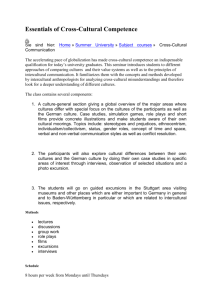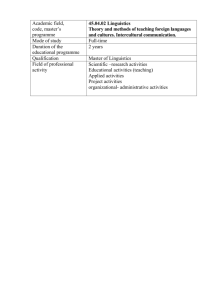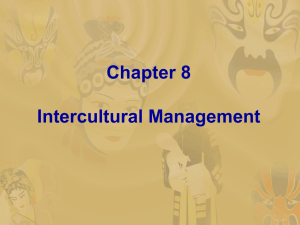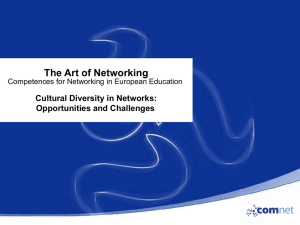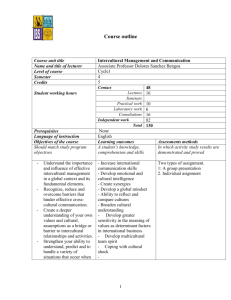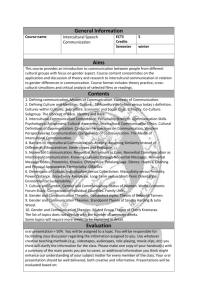Theory, Practice and Methodology
advertisement
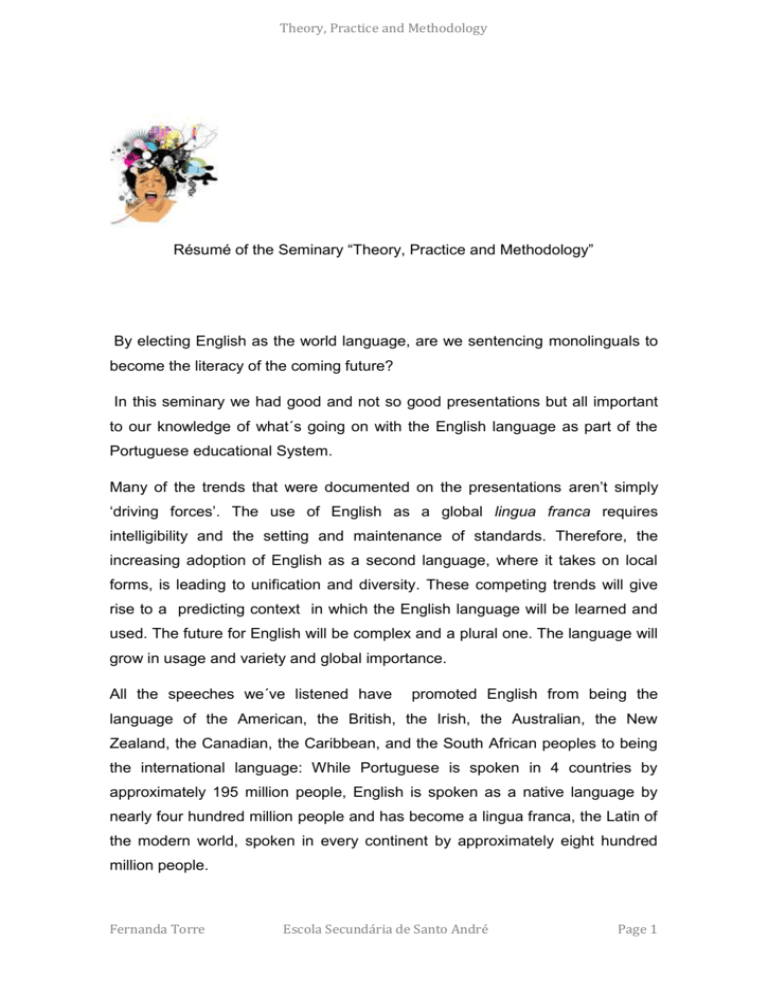
Theory, Practice and Methodology Résumé of the Seminary “Theory, Practice and Methodology” By electing English as the world language, are we sentencing monolinguals to become the literacy of the coming future? In this seminary we had good and not so good presentations but all important to our knowledge of what´s going on with the English language as part of the Portuguese educational System. Many of the trends that were documented on the presentations aren’t simply ‘driving forces’. The use of English as a global lingua franca requires intelligibility and the setting and maintenance of standards. Therefore, the increasing adoption of English as a second language, where it takes on local forms, is leading to unification and diversity. These competing trends will give rise to a predicting context in which the English language will be learned and used. The future for English will be complex and a plural one. The language will grow in usage and variety and global importance. All the speeches we´ve listened have promoted English from being the language of the American, the British, the Irish, the Australian, the New Zealand, the Canadian, the Caribbean, and the South African peoples to being the international language: While Portuguese is spoken in 4 countries by approximately 195 million people, English is spoken as a native language by nearly four hundred million people and has become a lingua franca, the Latin of the modern world, spoken in every continent by approximately eight hundred million people. Fernanda Torre Escola Secundária de Santo André Page 1 Theory, Practice and Methodology In addition, it is estimated that 75 percent of all international communication in writing, 80 percent of all information in the world's computers, and 90 percent of Internet content are in English. As it was referred in its role as a global language, English has become one of the most important academic and professional tools. The English language is recognized as undoubtedly the most important language for the increasingly mobile international community to learn. This is a fact that seems to be irreversible. English has become the official language of the business and scientific worlds. In my résumé, I´ll focus my arguments on the speeches whose subjects concern me more: intercultural communicative competence, Cultural awareness and Globalization. All the three speakers considered a pedagogical aim to encourage learners to have an interest in knowledge about and opening towards foreign cultures, peoples and countries. The commonly accepted objective of foreign-language teaching is “communicative language competence”, which has been defined as the competences which empower a person to act using specifically linguistic means and as comprising several components: linguistic, sociolinguist and pragmatic. But in fact, foreign-language teaching includes at least two languages and cultures, the learner’s own culture and language and a foreign culture and language. So, it looks natural to try and raise consciousness in learners of the fact that people speaking other languages may also see the world in ways different from their own. As we saw, throughout the seminary, the concept of intercultural communicative competence is not the same as communicative competence plus cultural awareness. Intercultural competence is a concept of views of society with interest in cultural difference and the relationship to someone else. An intercultural competent person is someone who can cross borders and can mediate between two or more cultural identities. They are not like tourists who Fernanda Torre Escola Secundária de Santo André Page 2 Theory, Practice and Methodology tend to float over cultures. They are determined to understand, to get an inside view of the other person’s culture and at the same time, contribute to the other person’s understanding of their own culture. Therefore, an intercultural competence user of a foreign language not only involves the gaining of communicative competence in that language, it also involves the acquisition of particular skills, attitudes, values, knowledge items and ways of looking upon the world. There are some components which contribute to the language user’s ability to communicate. These components are: declarative knowledge, skills and knowhow, existential competence and the ability to learn. Foreign-language teachers are supposed to include in their lessons problembased or task-based activities . In fact, there are many of us who occasionally include this kind of exercises. The goal of these exercises is the satisfactory completion of a meaningful communicative task. Problem-solving activities of this kind encourage critical thinking, collaborative learning, self-initiated knowledge acquisition, cooperative evaluation of alternatives and collective decision making. These activities use language elements and language production used in the real-world. But it was also said that the learners don’t, usually, work in group, they are used to work individually. So, how can someone, who doesn’t talk to anyone in that language, learn it? As a critical view of the teaching of English it was said that pupils do not talk about culture, express their points of view or even are they used to be critical. They just learn grammar and not much more than that. But as teachers, we should do tasks which invite the learners to reflect about norms, values, behavior of their own culture and to identify the similarities and the differences between them and other cultures. We usually take as point of reference the foreign culture, not the learner. The questions should ask is whether or not this body of knowledge is of any use or Fernanda Torre Escola Secundária de Santo André Page 3 Theory, Practice and Methodology interest to a particular learner group. They should consider whether these learners can relate to and understand the information presented to them. The cultural contents selected by us should have the potential of raising the learner’s awareness of possible cultural divergences and misunderstanding, as well as of the feelings, opinions and attitudes these divergences may bring about in people whose intercultural competence is not well developed. Therefore, in foreign-language teaching cultural contents continue to be presented from a monoperspectival point of view, and culture continues to be conceived as a static, idealized, undiversified object of study. In my opinion, the intercultural dimension of a foreign-language is about more than teaching communicative competence, passing on an extensive body of information about the foreign culture which tends to be associated with the foreign language one is teaching. The acquisition of intercultural communicative competence, of course, requires that one increases one’s familiarity with foreign cultures, with one’s own culture and with relationships between cultures. As the world is in transition, so the English language is itself taking new forms. As everybody knows, this is true. English has changed abruptly in the last 1500 years, reflecting contact with other languages and people, reflecting the need of people in changing the communication. All around the world English is the main source for a social life, acquiring a vitality of its own, developing in ways that reflect the interaction between people from different cultures and languages. A good example is the differences between the kind of English used in Britain and the one used in America. The English is always used in leading technology and scientific development, which take us to a critical point: within a decade or so, the number of people who have English as a second language will exceed the number of native speakers. But as new technologies keep developing, so does English language. As we entering the new era, the new ways of communicating in English – like internet - can upset the traditional pattern of communication which took a lot of work to build. Also, in this new era, English language will have such an important role on economic, political and cultural life - The moment in history where a global language has emerged. As we´ve seen, English is considered to be a global language because of its large distribution of Fernanda Torre Escola Secundária de Santo André Page 4 Theory, Practice and Methodology speakers and continuous growth and influence. It is also responsible for the number of endangered languages that exist nowadays. All the debates that surrounded this issue approach its benefits, such as the aid to intercultural dialogue, the search for international peace, the facilitation of political and economical organisation and its dominant role in the flow of knowledge; but also, its negative impacts, among which are the threat to other languages and to the development of multilingualism, and its role in deepening social differences. The task for English speakers is to stop it being a killer language and change it to an additive asset. It is estimated that 85% of international organisations use English as one of their working languages; other proof of the global importance of English is its position as the language which publishes more titles in various areas including numerous pure sciences. Nowadays, it is becoming apparent that all spoken and written languages form a global medium of human communication and make the circulation of ideas possible; it is fair to conclude that the task of a language is located in society, working as a will to community. One of the language rights such as teaching the mother language, accessing cultural services, having a representative presence of the language/culture in the media and receiving attention from government bodies, should be respected when concerning language groups. On one hand, there is a defence of multiculturalism which calls for a democratic culture based on the acceptance of social difference having in account identity and representation; on the other hand there is a doctrine based on conservatism involving canonical notions of education and the desire of imposing a common culture. In my opinion, the growth of the English language can’t be stopped and has more advantages than disadvantages; if citizens from all over the world have a language in common they can change ideas and general knowledge. The globalization of this language gives people the opportunity to have access to new cultures and traditions and to different views of the same subject; in addition, it facilitates communication between international companies as well as the political and economical organisation of the world concerning a common reference. The main disadvantage of this drastic growth of influence is that it is killing minority cultures and languages in opposition to the principles of Fernanda Torre Escola Secundária de Santo André Page 5 Theory, Practice and Methodology multiculturalism, diversity and acceptance of difference; in order to prevent this massive extinction, the L2 (second-language) and EFL (English as a foreign language) speakers must use English language as an additive asset that helps the communication with other peoples and allows a convergence of values, with the aim of facilitating the social, cultural, political and economical relations between them. In what concerns L1 (first-language) speakers, they have the advantage of speaking a global language and so, there is no practical need of learning another; the problem comes with the cultural needs that are not satisfied because of the lack of investment by the governments in teaching other languages such as Spanish or French in public schools, mainly in America. As a result, the citizens are stated to be the poorest in what concerns cultural and linguistic aspects, as well as in international literature. The ability to communicate worldwide is vital in a world of increasing globalization, of the multiple possibilities of cross-border contact and exchange of information that the media provide, of a high level of private and professional mobility. This implies the availability of knowledge, skills and strategies which enables people to take responsibility for communication beyond the borders of their own cultural ties. I also believe Language is an essential part in the intercultural contact process. Without the ability to communicate with each other, it would be impossible to know other cultures and to have a mutual ``understanding´´ worldwide. Language is the verbal expression of culture. A culture of language learning contains everything its speakers can think about and every way they have of thinking about things. Language, should be an integrated component of culture and language learning is also cultural learning. The interaction and relation between culture learning and language acquisition is very complicated. The personality development of our students in the process of learning a foreign culture and a foreign language will be massive, enabling them to increase and enhance their intelligence and opinion about other cultures beliefs, traditions and their ``ways of life ´´. Intercultural communication is beneficial to their development and understanding of different cultures. Fernanda Torre Escola Secundária de Santo André Page 6 Theory, Practice and Methodology Fernanda Torre Escola Secundária de Santo André Page 7

